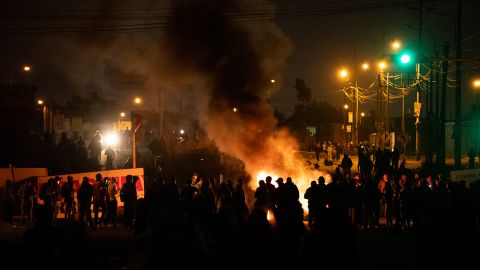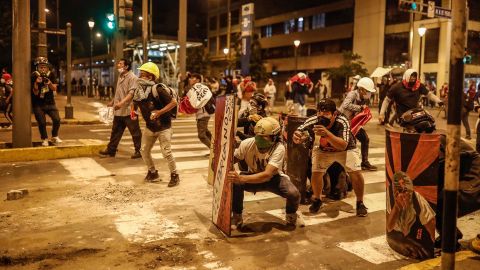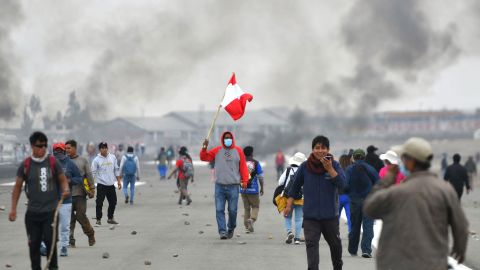Cnn
—
Peru’s former president Pedro Castillo has denied charges of conspiracy and rebellion, following his dramatic ouster and arrest last week. His court appearance on Tuesday came amid continued protests by Castillo supporters who saw at least seven people killed.
Castillo was impeached and arrested on December 7, after announcing plans to dissolve Congress and install an emergency government ahead of an imminent impeachment vote by lawmakers.
Dina Boluarte, its former vice president, has since become president. On Monday, Boluarte proposed bringing forward the general election by two years, to April 2024, in a televised speech.
During a virtual court hearing on Tuesday to challenge his seven-day detention order, Castillo told Judge Cesar San Martin, “I have never committed the crime of conspiracy or rebellion” and described his detention as arbitrary and unfair.
Dressed in a blue jacket and sitting next to his lawyer Ronald Atencio, Castillo also said, “I will never resign and abandon this popular cause.”
“From here I want to urge the Armed Forces and the National Police to lay down their arms and stop killing these people thirsting for justice. Tomorrow at 1.42pm I want my people to join me…” he also said, before being interrupted by the judge.
Since last week, demonstrations have erupted in cities across the country in support of Castillo, sometimes marked by clashes with Peru’s security forces,
At least seven people died in the demonstrations, including two minors, the press office of Peru’s ombudsman told CNNE on Tuesday. There were two deaths on Sunday and five on Monday.

Protesters have called for general elections, the dissolution of Congress and the creation of a new constituent assembly, according to Radio Programas del Perú radio and television station.
Boluarte called on Tuesday to restore calm to the country and said he had ordered police not to use lethal weapons against protesters.
“Everyone has the right to protest but not to commit acts of vandalism, burn hospitals, ambulances, police stations, storm airports, (these) are not normal protests, we have gone to the extreme,” added Boluarte.
Trains to and from Machu Picchu will be suspended from Tuesday due to protests from Peru, train operator PeruRail said in a statement.
“We are sorry for the inconvenience these announcements cause for our passengers; however, they are due to situations beyond our company’s control and seek to prioritize the safety of passengers and workers,” the statement read.

Flights were also halted due to the protests, with LATAM Airlines Peru announcing the temporary suspension of services to and from the airports in the cities of Arequipa and Cuzco.
Protesters attempted to storm the terminal at Cuzco’s Alejandro Velasco Astete International Airport on Monday, according to the Peruvian Corporation of Airports and Commercial Aviation (CORPAC).
So far there have been no reports of injuries, arrests or damage to the airport, according to CORPAC.

LATAM has called on the Peruvian authorities to take “corrective measures to ensure safety” for the operation of its flights.
“We are sorry for the inconvenience this situation beyond our control has caused our passengers,” he added.
Peru’s National Police said there were blockages on national roads in at least 11 regions of the country as of Monday evening.
In addition, the government has declared a state of emergency in seven provinces of the Apurimac region of south-central Peru.
Peru has been plagued by political instability in recent years, with many Peruvians calling for political change, according to a September poll by the Institute of Peruvian Studies, which found 60% of respondents supported snap elections to freshen up both the presidency and Congress.
It is unclear whether Boluarte’s ascension to the presidency can achieve widespread political consensus.
Boluarte “does not have a recognized political career,” said Fernando Tuesta Soldevilla, professor of political science at the Pontifical Catholic University of Peru. “And without partisan support, the political party or the social organization behind her, she’s weak to begin with.”
“Everyone knows when Dina Boluarte’s government started, but no one can be sure how long it will last,” he told CNN.
